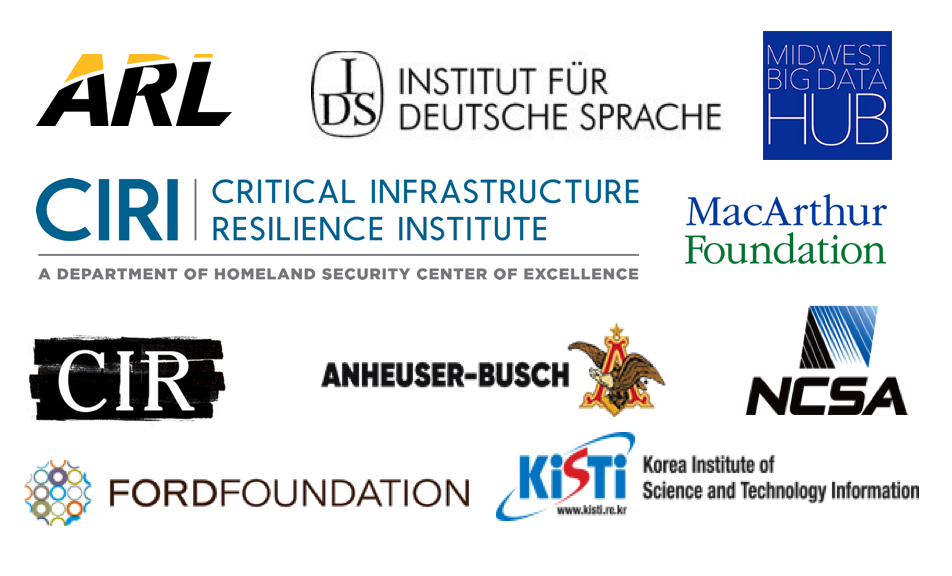Current Projects | Examples of Completed Projects
Examples of completed grants and projects:
Funder: FORD Foundation
This project proposed a solution for measuring impact of social justice documentaries in a theoretically grounded, systematic, empirical, scalable and rigorous fashion using computational approaches and to gain novel substantive knowledge providing actionable insights for film makers and funders...[Learn More]-
Predictive modeling for impact asessment, 2015-2016
Funder: National Center for Supercomputing Applications Faculty Fellowship
-
#2014-04922: Socio-technical data analytics for improving impact and impact assessment, 2014-2015
Funder: Anheuser Busch
-
Evaluation of the performance and usability of the ConText technology, 2013-2014
Funder: Center for Investigative Reporting
-
Gifts from:
- Peace is Loud
- Shoot First Inc.
- Picture Motion
- VM People
- Robert Stone Productions
- Relation extraction: evaluation of methods for extracting relational data from texts.
- Link labeling: development of domain specific model and method for edge classification.
- Network comparison: comparison of extracted networks to mandated interaction networks.
- Morality, stance, and images: measuring individuals’ perception from user-generated texts when they are exposed to various types of information with embedded stimuli.
Project Description:
Dr. Jana Diesner has led a three-phased project spanning over three years (2014~2016) in order to measure how data quality (name ambiguity) can affect our micro- and macro-level knowledge findings from bibliometric data including that generated and maintained by KISTI (Phase 1), based on quality-controlled KISTI data investigate the structure and evolution of collaboration patterns among almost 700,000 Korean scholars over the 65 years (Phase 2), and identify what mechanisms govern collaborator selection and influence among scholars drawing on social theories of human interaction (Phase 3).
Major findings include that (1) data quality can severely distort our understanding of bibliometric data, contrary to wide assumptions among informetrics scholars that such distortion is ignorable, (2) scholarly collaboration in Korea have grown exponentially but shown trends toward a highly centralized, hierarchical structure depending heavily on a small number of top scholars, and (3) traditional network-structure-based analysis do not explain or predict much formation of collaboration among scholars, leading Dr. Diesner to propose a new framework for detecting the impact of influence in scientific collaboration.
Funder: KISTI (Korea Institute of Science and Technology Information)
- Analysis of academic activity patterns in academic literature, 2017 (Co-PI: Vetle Torvik)
- Selection versus Homophily in Scientific Collaboration Networks, 2016
- #C3240: Modeling of nation-scale scientific collaboration networks and impact of entity disambiguation on big network data, 2015
- #P14033: Authority data based scientist network analysis, 2014
Project Description:
Researchers frequently collect, use, and analyze publicly available data from social networking platforms, online production communities, and customer review websites, among other sources, as part of their research activities. Technically, it can be feasible and straightforward to access and obtain public data, while considering the ethics, norms, and regulations applicable to these data requires additional awareness, knowledge and skills. This is partially due to the fact that multiple types of rules may apply. We provide an overview on these types of regulations, and also clarify on common misassumptions between free as in “free speech” (i.e. freedom from restriction, “libre”) versus free as in free beer (i.e. freedom from cost, “gratis”). We outline several approaches to responsibly conducting research with public available data, and solutions to enhancing the expertise of researchers on implement data regulations, especially for the case of human centered data science.
Funder: Midwest Big Data Hub & Computing Community Consortium
-
#2014-04797-00-00: Predictive modeling for detection and classification of medical entities and facts, 2015-2017
Funder: Intelligent Medical Objects
-
#2013-05716-00-00: Computational expansion of controlled medical vocabulary and identification of organizational social media footprint, 2013
Funder: Intelligent Medical Objects
-
Developing an entity extractor for the scalable construction of semantically rich socio-technical network data, 2013 (Co-PI: Brent Fegley)
Funder: Start-up allocation award from Extreme Science and Engineering Discovery Environment (XSEDE)
Thanks to our sponsors:
